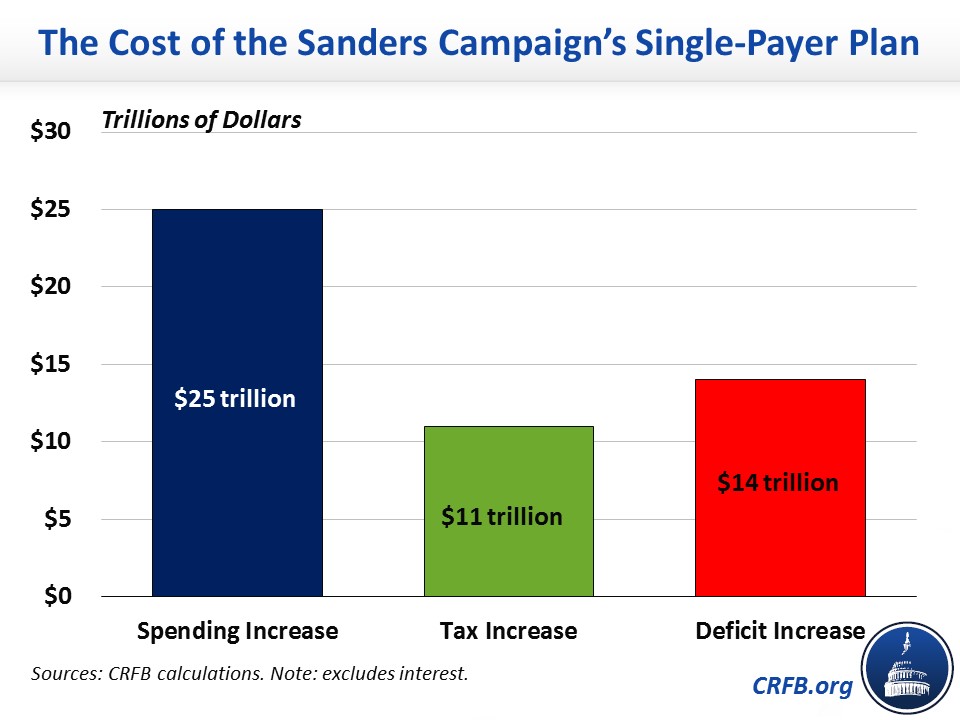Fact Checking Medicare for All Claims from the Fourth Democratic Primary Debate
During the fourth Democratic primary debate of the 2020 presidential election cycle, former Vice President Joe Biden and South Bend, Indiana Mayor Pete Buttigieg made a number of statements related to the potential cost of a Medicare for All plan.
During our live tweeting of the debate – which we do for all debates as part of our US Budget Watch 2020 series – we tweeted brief fact checks of these claims, which ranged from “true” to “largely true” to “largely false.”
We have compiled and briefly expanded upon those four fact checks below.
-
Medicare for All will cost $30 trillion over ten years – True
-
The annual cost of Medicare for All would be more than the entire federal budget – Largely False
-
Eliminating the Department of Defense entirely would pay for only four months of Medicare for All – Largely True
-
Medicare for All has a multi-trillion dollar funding hole – True
Claim #1: Medicare for All will cost $30 trillion over ten years
During the debate, former Vice President Biden stated the Medicare for All plan favored by several candidates would cost ”at least $30 trillion over ten years.” That’s largely true: a range of third party estimates found that Senator Sanders’s 2016 Medicare for All plan would cost $25 trillion to $36 trillion over a decade, with the average at about $30 trillion.
More recently, a new study from the Urban Institute and Commonwealth Fund found that a single-payer system like Medicare for All, with broad benefits and no cost-sharing, would cost the federal government about $32 trillion (net of $34 trillion of spending and $2 trillion of revenue). Depending on provider payment levels, administrative costs, and state contributions, that figure could fall to as low as $27.5 trillion and as high as $35 trillion.
Importantly, these totals represent the increased cost to the federal government, not the change in total national health expenditures. At the same time federal costs would go up, costs to the private sector – including premiums and cost-sharing – would go down. The net effect could be a decrease or increase in national health expenditures. Though the change could be significant, it would be far smaller than the effect on the federal government alone. For example, Charles Blahous estimated that if Medicare for All were able to sustain Medicare rates, national health expenditures could be as much as $2 trillion lower and under a more realistic scenario they would be $3.3 trillion higher. The Urban Institute estimates a $700 billion increase in national health expenditures in 2020.
Regardless of the effects on national health expenditures, federal costs would certainly go up under Medicare for All – and so far no candidate has outlined a complete plan to offset those costs.
Ruling: True
Claim #2: The annual cost of Medicare for All would be more than the entire federal budget
Immediately following his first claim about the $30 trillion cost of Medicare for All over a ten-year period, former Vice President Biden went on to claim, “That is more on a yearly basis than the entire federal budget.” We find that statement to be largely false.
In Fiscal Year (FY) 2019, federal spending totaled just over $4.4 trillion, and is projected to rise to $4.6 trillion in 2020. By comparison, the Urban Institute estimates Medicare for All would cost about $2.8 trillion (a bit less after accounting for revenue feedback) more in 2020 than what is spent under current law. Based on those estimates, the cost of Medicare for All would equal about 60 percent of the total federal budget and two-thirds of the non-interest budget.
While the marginal cost of Medicare for All would be less than the current federal budget, total federal spending on healthcare under a Medicare for All program would rise to about $4 trillion in 2020, which would be more than all other spending in the federal budget at roughly $3.5 trillion.
Ruling: Largely False
Claim #3: Eliminating the Department of Defense entirely would pay for only four months of Medicare for All
Later on in the debate, after repeating his first two claims about the cost of Medicare for All, former Vice President Biden stated,
“If you eliminated the entire Pentagon, every single thing – planes, ships, troops, the building, everything, satellites – it would get you and pay for a total of four months.”
Assuming former Vice President Biden is referring to how much you could pay for each year, we find this statement to be largely true – and perhaps even an understatement.
According to the Congressional Budget Office, defense discretionary spending will total $700 billion next year. This would cover about one-quarter of the annual cost of Medicare for All, the equivalent of three months’ worth.
To cover four months' worth of Medicare for All, one would have to include the $73 billion spent on military pensions and other mandatory defense spending and the $211 billion spent on veterans programs. This change would bring the total to $984 billion, enough to cover 4 months and 1 week of the program.1
Ruling: Largely True
Claim #4: Medicare for All has a multi-trillion dollar funding hole
Earlier in the debate, Mayor Buttigieg claimed that Medicare for All has a “multi-trillion dollar hole” that its advocates have not addressed. We find this statement to be true.

Of the candidates who have proposed Medicare for All plans, only Senator Sanders has put forward a comprehensive package of offsets. In 2016, we estimated these pay-fors would generate $11 trillion through 2027, enough to cover 45 percent of the $25 trillion cost we estimated at the time. That would leave a $14 trillion "hole" to be filled.
Encouragingly, Senator Sanders has since proposed larger tax increases which would raise somewhat more than the $11 trillion we estimated in 2016. However, these policies are now classified as "options" as opposed to proposals and were not included in Senator Sanders’s 2019 legislation. More importantly, these options – even if enacted all together – would fall well short of raising the $30 trillion necessary to fully offset the plan, and are unlikely to cover much more than half of the cost of Medicare for All. Though we have not formally estimated these new proposals, it is clear that they would indeed leave a "multi-trillion dollar hole."
In the coming weeks, the Committee for a Responsible Federal Budget will release a paper detailing options to fill this hole and finance the full cost of Medicare for All, incorporating the trade-offs and consequences of selecting different options.
Ruling: True

1Estimates do not account for potential interactions between Medicare for All and defense spending


